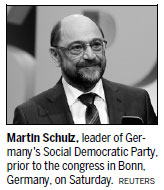Germany's SPD to vote on coalition talks with Merkel's conservatives
BONN - Germany's Social Democrats will decide on Sunday whether to start formal coalition talks with Chancellor Angela Merkel's conservatives, a move which would bring Europe's economic powerhouse one step closer to a stable government.
SPD leader Martin Schulz is facing a strong backlash from the party's left and youth wings, which argue that the SPD should reinvent itself in opposition after scoring its worst election result in September since Germany became a federal republic in 1949.
Around 600 delegates, meeting in Bonn, will debate and vote on whether their leaders should push ahead with coalition talks on renewing an alliance with Merkel's conservatives that took office in 2013.
The two blocs, which both bled support to the far right in the Sept 24 election, struck a preliminary deal last week but critics, including the party's youth wing leader Kevin Kuehnert, say the agreed blueprint does not bear enough of the SPD's hallmarks.

Sunday's vote will also be watched closely abroad as Germany has Europe's largest economy and Merkel has long played a leading role in the continent's economic and security affairs.
Senior Social Democrats have cited progress in efforts to win support for formal talks after the SPD's biggest regional branch in North Rhine-Westphalia recommended its members vote in favor of entering negotiations - on condition that Schulz push for more concessions on labor, health and migration policies.
SPD parliamentary leader Andrea Nahles said she expected formal talks to happen. "Nevertheless, I ask everyone in my party to take responsibility: Please consider the consequences if this government option fails," she told Welt am Sonntag.
New treaty
Meanwhile, Macron and Merkel have pledged to agree on a new French-German treaty this year to deepen cooperation between the countries.
In a joint statement on Sunday, both leaders said they will seek closer economic ties and convergence on tax issues.
They also want to develop a common diplomatic approach, boost cooperation on foreign affairs and security including the fight against terrorism, and "defend more effectively French-German common interest and values."
The statement was timed to commemorate 55 years since the signing of the 1963 Elysee treaty, which marked the reconciliation between France and Germany after World War II.
The leaders also pledged to improve cooperation in education and research and to develop joint proposals for climate protection.
Reuters - Ap
(China Daily 01/22/2018 page11)














